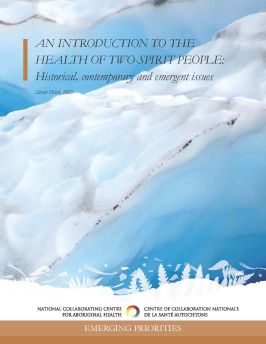An Introduction to the health of Two-Spirit people: Historical, contemporary and emergent issues
Cette ressource est également disponible en français.
“The well-being of Two-Spirit people should be of concern to anyone working to build the capacity of communities to achieve health equity for all, truly bringing meaning to the teaching “all my relations.””
This 2016 report, written by Dr. Sarah Hunt and produced by the National Collaborating Centre for Indigenous Health (NCCIH), is an introduction to Two-Spirit health for all public health practitioners engaged in health equity work.
This resource summarizes available research and community considerations on the structural and social determinants of the health of Two-Spirit people. Two-Spirit refers to individuals with diverse sexualities and genders who are Indigenous to North America.
Colonialism and Two-Spirit Health
The author roots this evidence summary in an important foundational concept: “The health of Two-Spirit people must be understood within the dual context of colonial oppression and the vitality and strength of Two-Spirit resurgence.”
Colonization and the colonial assimilation process significantly impacted Indigenous understandings of gender and sexuality. This resource describes why colonialism is a root cause or structural determinants of health for Two-Spirit people, and how colonialism intersects with transphobia, homophobia, and racism to have specific harmful impacts on Two-Spirit health.
Resurgence of decolonized Indigenous gender roles
The report ends with a discussion of the resurgence of decolonized Indigenous gender roles and Two-Spirit community building with implications for public health practice, programming, policy and research. It emphasizes that understanding of Two-Spirit health must be rooted in the vibrant resiliency, resurgence and reclaiming of Two-Spirit peoples’ roles, identities, and community.
There is also an accompanying 2017 NCCIH webinar and self-reflection and community assessment questions.
Use this resource to:
- Build understanding of colonialism, homophobia and transphobia as structural determinants of health for Two-Spirit people
- Challenge systemic erasure of Two-Spirit people in public health programming, policies and research
- Foster cultural safety for Two-Spirit people by listening to the accompanying NCCIH webinar and working through the self-reflection and community assessment questions on your own or with your colleagues
Related Resources:
To learn more about what Two-Spirit means and how public health practitioners and policy makers can support Two-Spirit communities, check out Episode 6 “Disrupting Colonialism for Two-Spirit Health” of the NCCDH’s Mind the Disruption podcast.
BCCDC COVID-19 language guide: Guidelines for inclusive language for written and digital content
Reference
Hunt, S. (2016). An introduction to the health of Two-Spirit people: Historical, contemporary and emergent issues. National Collaborating Centre for Indigenous Health. https://www.nccih.ca/495/An_Introduction_to_the_Health_of_Two-Spirit_People__Historical,_contemporary_and_emergent_issues.nccih?id=156
Tags: Indigenous health, 2SLGBTQI+ health, Other National Collaborating Centre, Document, Report / Document
